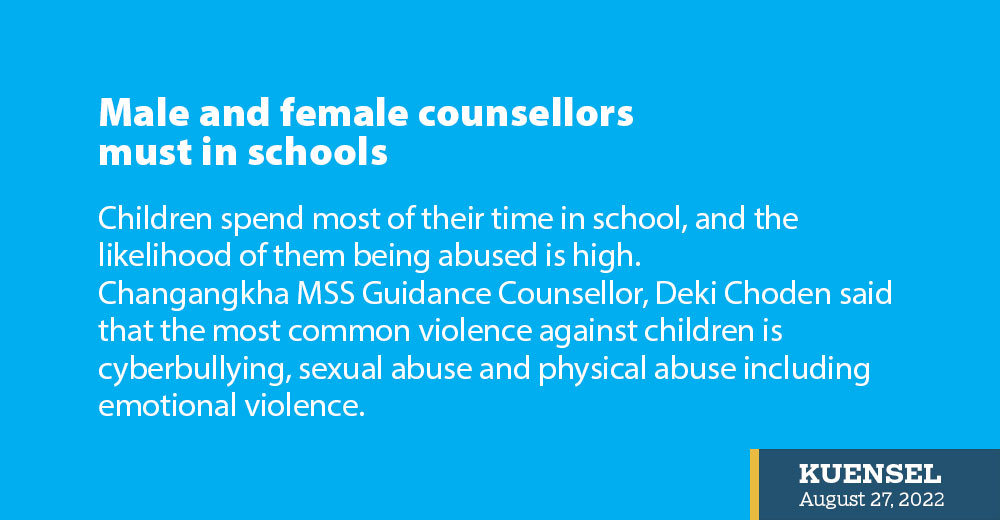Thukten Zangpo
Children spend most of their time in school, and the likelihood of them being abused is high.
Changangkha MSS Guidance Counsellor, Deki Choden said that the most common violence against children is cyberbullying, sexual abuse and physical abuse including emotional violence.
She said that most teenagers are seeking support. “This group requires intensive counselling, unlike the younger lot who works with advice.”
Deki Choden said that sexual violence was more among girls. However, most of them do not share about it, because the naming and shaming culture is prevalent. “Adults should earn their trust.”
Dechentsemo Central School Counsellor in Punakha, Ngawang Sonam, said that domestic violence and neglect are common issues in the school.
“Children complain that they do not get adequate guidance,” he said. “Children also said that they are happy to stay in school than going home in one of the school surveys.”
Deki Choden also said that girls are more comfortable to talk about sexual violence with the female counsellors. However, if boys are involved, she said that the children are referred to male counsellors in other schools. “If each school has a male and a female counsellor, preferably from primary school, it would be very beneficial.”
She also said that firstly having counsellors in primary schools would be much more beneficial since there would be not many issues when they study in higher grades.
Male counsellors said that girls mostly do not approach them when on issues related to gender and they consult the school matrons.
There are no counsellors in primary schools and some middle and lower secondary schools. There are 170 school counsellors in secondary schools.
As per the standard, there is a requirement of one counsellor for every 400 students. Currently, a counsellor handles more than 1,000 students in schools across the country.
However, the psychosocial support teachers are assigned the task in place of counsellors. Counsellors said that these teachers do their best to help but often it requires professionals.
Career Education and Counselling Division Chief, Reena Thapa said that children who are exposed to violence or victims of violence have a high risk of developing cognitive, social and emotional impairments that will lead to adopting health risk behaviours.
“These children have a high risk of developing cognitive impairment leading to losing focus on studies. Their academic performance will deteriorate gradual and are at a high risk of dropping out of school,” she added.
Counsellors said that the children after being exposed to violence receive counselling and are sent back to the class. “It is not a one-time fix, lots of continued support is required.”
They said that it was important to seek mental health experts’ advice, if a child has developed post-traumatic stress, anxiety and depression. A counsellor suggested having a Mental Health Act.
If the children are the victims of violence, Reena Thapa said the cases will be assessed and provide necessary interventions and referrals.
Counsellors said lack of advocacy and implementation are the causes of the violence against children.
“A comprehensive sexual health component in the school curriculum and community awareness involving local leaders would be beneficial,” a counsellor said.
Children seeking counselling services face stigma and discrimination and are sometimes labeled as mad, counsellors said.
The school guidance counsellors conduct Parenting Education Programme through which parents are educated on positive parenting skills and also create awareness of the Child Care and Protection Act.
The other programs include awareness of anti-bullying and inviting guest speakers from relevant agencies like the Royal Bhutan Police to provide awareness talks on the Penal Code of Bhutan, penalties and offences.


